
United States ( Europe Brief News): A federal judge ruled that Trump overstepped his authority by firing the U.S. Institute of Peace board and attempting to dismantle its operations.
According to U.S. District Judge Beryl Howell, President Trump illegally fired the USIP president and board members, and they ought to be reinstated.
The transfers of the institute’s assets, including its headquarters, that were taken during the administration’s seizure are deemed void, according to Howell’s 102-page order.
Howell said that Trump’s attempt to seize control of USIP “represented a gross usurpation of power and a way of conducting government affairs that unnecessarily traumatized the committed leadership and employees of USIP, who deserved better.”
Trump ordered the institute’s operations to be completely dismantled earlier this year and dismissed the president and board members.
The institute’s headquarters were subsequently forcibly taken by a team from Elon Musk‘s Department of Government Efficiency, which then proceeded to shut it down.
In an attempt to stop the takeover, five board members filed a lawsuit. According to their case, they should be reinstated because they were wrongfully dismissed from their employment.
The question of whether USIP is a part of the federal government and, if so, whether it is a part of the executive branch was a major focus of the case before Howell.
The dismissed board members have maintained in court and in their pleadings that USIP is not a federal agency. On the other hand, the Trump administration has maintained that the institute is a part of the government and is under the executive branch, which gives Trump the power to fire the board.
In her decision, Howell stated that USIP “is unique in its structure and function — neither a traditional executive branch agency nor an entirely private nonprofit corporation.”
Howell came to the conclusion that although USIP is not a part of the executive branch, it must be regarded as a part of the federal government.
“Instead, USIP supports both the Executive and Legislative branches as an independent think tank that carries out its own international peace research, education and training, and information services,”
she wrote.
Trump’s dismissal of the USIP board members was illegal, and subsequent moves to reduce USIP to its “statutory minimums,” fire its president, fire its employees, and give the General Services Administration the institute’s assets are also illegal.
What are the implications of this ruling for future presidential actions in the United States?
The decision upholds that presidents are not unrestricted in their ability to dismiss or swap out the leadership of independent federal organizations created by Congress, particularly those that are intended to function independently of the executive branch. This establishes a precedent requiring future presidents to honor these organizations’ statutory independence.
The ruling protects the independence of federal agencies and organizations, restricts executive overreach, and maintains checks and balances by invalidating the illegal firing of USIP’s president and board and returning control to them.
The decision strengthens the judiciary’s role in upholding the separation of powers by showing that courts may and will step in to stop presidential actions that go beyond what is constitutional.
Presidents cannot impose their will without court’s approval, as evidenced by invalidation of asset transfers and the ban on additional intervention.


